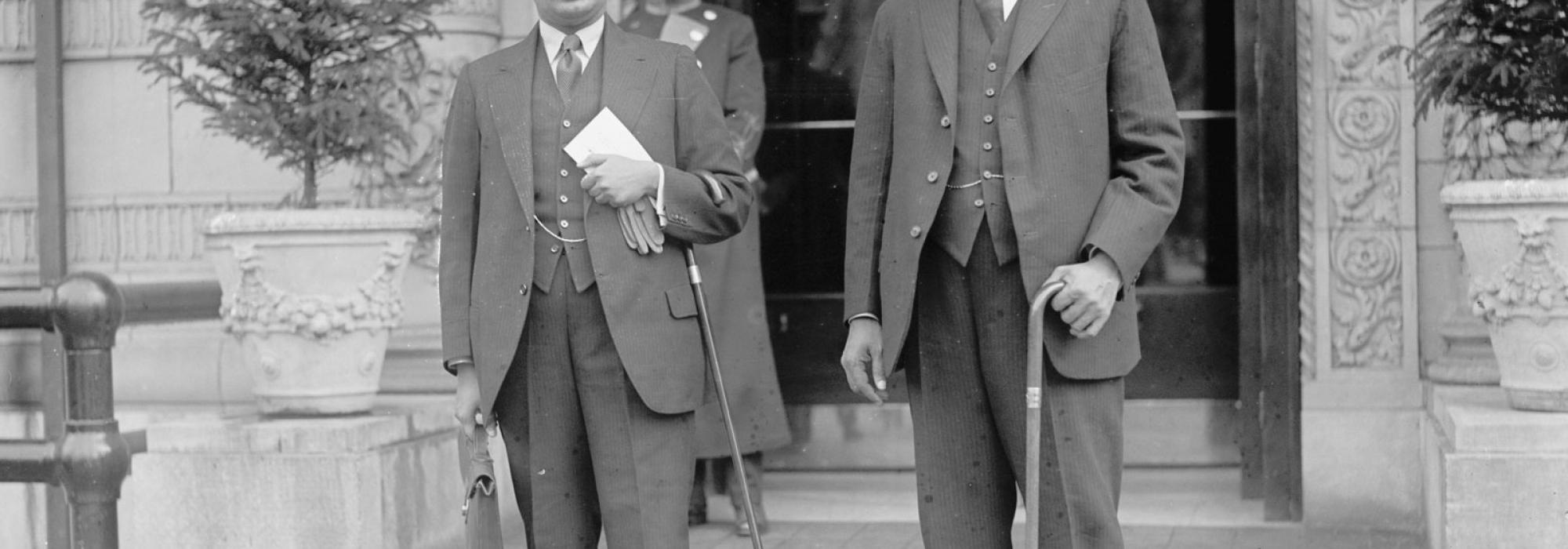Meetings and Hospitality
Every evening about seven to eight of us met at Srinivasa Sastri's house in Bangalore. Dr. B K Narayana Rao, M S Ramachandra Rao, N N Iyengar, S G Shastri, Prof. Sampath Kumaran and other were aomong those who regularly came for such get-togethers. We were also accompanied by Judge Srinivasa Iyer and D Venkataramayya at times. We had friendly conversations for about an hour or two. Dewan Sir Mirza Ismail and Sir S P Rajagopalacharya visited the place often.
No Envy
When Sir S Radhakrishnan, who was honoured by the Oxford University in England returned to India, Srinivasa Sastri wished to organize a get-together to welcome him back and to congratulate him. There were about fifty to sixty people who had gathered there. Sastri was thrilled by the fact that an Indian had received such a high honour in England. He spoke about this to everyone he knew.
There is another incident that comes to my mind when I speak of Sastri’s humility that was devoid of all envy.
There was a round table conference in London back in 1931 which involved people belonging to various parties. There was a discussion regarding the choice of the leader for the Indian representatives who were to attend the conference. Many of those selected representatives were of the opinion that Srinivasa Sastri should lead them at the conference. They met Sastri and expressed their opinion to him. In reply, Sastri said, “I don’t deserve to have the honour that you all want me to bear. Sir Tej Bahadur Sapru should be our leader. Let us visit him and request him to lead us!”
Representatives – “We feel that you are more suitable for the post than him. He is known to be short-tempered and egoistic”
Sastri – “Tell me – what is more important for you at this juncture? To ensure that our endeavour goes about smoothly or to harp on individual differences. Just give a thought to what I am trying to say. Currently, the primary person on the side of the British Government is Lord Reading. His words bear a lot of weightage on the British ministers. Lord Reading was one of the earlier Viceroys of India. He was also a famous lawyer and happened to be the Lord Chief Justice of England. During his term as the Viceroy of India, Tej Bahadur Sapru was the Law Minister in his cabinet. Thus, Lord Reading is aware of Sapru’s expertise in law and his scholarship. He has great respect for Sapru. Therefore, there is a great possibility of Sapru’s words making an impact in the Bristish Parliament. As we all know, Sapru was a part of the Viceroy’s Council; he has taken active interest in several administrative matters related to our country and knows them in and out. He knows the working procedures and subtleties thereof by heart! Have I ever had such experience? No! What we need now is words of advice which are rooted in experience. What provinces should fall under our rule? How are we to manage whatever comes under our control? Sapru can understand these matters very well and he can present it well in the meeting. The British are going to take him seriously and will take him seriously. Why would you want to give me preference over such a well-qualified person? Is this the way to work? Yes, it might well be true that Sapru is a bit short-tempered. He seems to speak in an emphatic tone at all times. We should not turn these into aspects that dictate our decision at this juncture. He is our leader. I will come with you as well. Let us go convince him together.”
An Experience of Sorts
Srinivasa Sastri displayed great excitement when anyone did something that he deemed to be worthwhile. The person's age and qualifications did not matter to Sastri. Once, I had written an article titled – ‘A Dubious Experiment.’ It was about Dr. Brajendra Nath Seal who was the Vice-Chancellor of the Mysore University back then and he had been appointed as an ‘Extraordinary Member’ in the Council of Ministers. I had argued that these set of events were unwarranted and my article was published in The Hindu newspaper published from Madras. On the day the article got published, Sastri was in Mysore. He intended to come to Bangalore the following day or on the day after. He did not know that I had written such an article and I hadn’t informed anyone of this particular writing of mine. It was in the afternoon at about two that the article caught Sastri’s eyes. He immediately set out to Bangalore. His friends told him, “Why this hurry?”
Sastri said, “I need to meet that Fellar this evening. I would like to congratulate him.”
He informed me of his coming through a telegram and asked me to see him at the railway station. I went with a few of my friends to the railway station. As soon as he saw my face, Sastri stood there with excitement emanating through out his body. Ah! What heartfelt appreciation he had for me! Such moments are like elixirs of life.
Love for Scholarship
Once, when we were in Mysore, Sastri told me, “Mysore is full of great scholars. I have heard that many renowned scholars live here even today. Do you know any scholars of literature who reside in Mysore? I would like to learn a few sections of the Dhvanyāloka from them.”
I enquired around and told him: “Narasimha Sastri who hails from Hassan has earned great credibility amongst today’s scholars. I have seen a lecture that he delivered in the University campus. I have a feeling that he has good hold over traditional poetics. If you wish, I can bring him here.”
Sastri said, “Why should you bring him here? Let us go to him!”
Accordingly, we went to Narasimha Sastri’s house and saw that he was extremely unwell. We decided that it might not be a good idea to bother him with our questions under his current state and it would be better if we met him when he had regained health. Thinking thus, we returned.
Regard for Hiriyanna
Another scholar in Mysore who Srinivasa Sastri was excited about meeting was Prof. M Hiriyanna. Every time Sastri was in Mysore, he never missed a chance to visit Hiriyanna. Sastri had great regard for Hiriyanna’s scholarship and his ethical outlook. Sastri often remarked that Hiriyanna was a noble soul and a sincere person. They were great friends. Whenever they met, they spoke with immense admiration for each other. When I visited Hiriyanna’s house with Srinivasa Sastri, he was made to sit on the only chair in the house by the host, Hiriyanna, who sat down on the floor on a mat. Looking at this, Sastri got up from the chair, stood by the wall and said, “I prefer to stand. I find it difficult to sit on the floor.” Hiriyanna laughed and sat on a bench nearby. The conversation between the gaints then began. I remember one of the questions that Sastri asked Hiriyanna: “With scholars like you around, is it necessary to train scholars in the old, traditional manner? What is the state of the scholars who get trained in English at our Universities along with Sanskrit?”
Hiriyanna answered with a gentle smile on his face – “The scholarship that is churned out of our universities today is feeble, decrepit. If traditional scholarship is nurtured alongside, it will certainly benefit the society. The scholarship of the yesteryear does not exist today and to expect profundity from meagre study at the university is impractical. The scholarship of our ancients was precise and deep. We should try to protect such scholarship today.”
As far as I know Sastri was of a similar opinion too. He considered the study of alaṅkāra-śāstra (Poetics) and kāvya (Classica literature) as important as the study of Mīmāṃsā and Vyākaraṇa. Only those who have incisive insights into a variety of areas were considered real scholars by Srinivasa Sastri. Along with traditional study, the scholars were to have an objective mind and the capability to analyse things. For this to happen, Sastri felt that the scholars had to possess working knowledge of English which would help them gain access to contemporary social issues and scientific advancement. If the scholars ignore the world around them in the name of traditional scholarship, their scholarship would have no use for the modern world. Sastri had told us about this opinion of his several times.
To be continued...
This is the twelfth part of the English translation of the Second essay in D V Gundappa’s magnum-opus Jnapakachitrashaale (Volume 6) – Halavaru Saarvajanikaru. Edited by Hari Ravikumar.















































